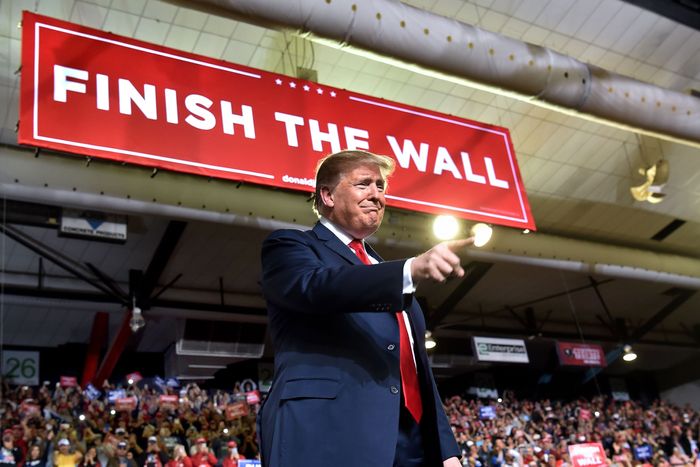
After a brief moment when it looked like negotiations were breaking down as the deadline for avoiding a second government shutdown approached, a deal seems to be falling into place. And by any normal measure, it represents a humiliating defeat for Donald J. Trump, as the Washington Post’s Aaron Blake observes:
The deal as laid out does include some border fencing — $1.375 billion worth, or 55 miles. That’s well shy of the $5.7 billion and 200 miles in wall funding he demanded that led to the shutdown, but it’s not nothing. Trump could argue that he got something out of the 35-day government closure.
But only if you ignore two very important things.
One is that this compromise includes a concession to Democrats, too: a reduction in the number of detention beds …
But the bigger issue is this: The amount of funding is actually shy of the original deal Republicans and Democrats reached last year that Trump rejected. At that time, the spending bill for the Department of Homeland Security included $1.6 billion for 65 miles of fencing, both slightly more than the current tentative deal.
Already some conservatives are attacking the deal, as MarketWatch reports:
Fox News host Sean Hannity on Monday night criticized the bipartisan deal that would prevent another government shutdown, interrupting his coverage of President Donald Trump’s rally in El Paso, Texas, to deliver his take.
“On this new so-called compromise,” Hannity said, “I’m getting details — $1.3 billion? That’s not even a wall, a barrier. … We will get back into this tomorrow. Any Republican that supports this garbage compromise, you will have to explain — look at this crowd.”
Other conservative critics of the deal include some Republican lawmakers, such as North Carolina Rep. Mark Meadows, head of the Freedom Caucus.
“This does not represent a fraction of what the president has promised the American people,” Meadows told The Washington Post. “I don’t speak for the president but I can’t imagine he will be applauding something so lacking.”
So how can Trump accept this deal? And if he won’t, how did the negotiations get this far? Politico’s Eliana Johnson has a very plausible explanation:
All along, the White House has said that if Trump can’t get his border-wall money from Congress, he may secure it himself either by a national emergency declaration, or by some shadowy “executive action” short of that where he moves around unobligated dollars. Here’s Politico’s explanation of that second course of action, publicly aired by Mick Mulvaney on Meet the Press, which presumably won’t set the kind of alarming precedent an emergency declaration would involve:
The emerging consensus among acting chief of staff Mick Mulvaney and top budget officials is to shift money from two Army Corps of Engineers’ flood control projects in Northern California, as well as from disaster relief funds intended for California and Puerto Rico. The plan will also tap unspent Department of Defense funds for military construction, like family housing or infrastructure for military bases, according to three sources familiar with the negotiations.
“There are certain sums of money that are available to the president, to any president,” Mulvaney said on “Meet the Press” Sunday. “So you comb through the law at the president’s request … And there’s pots of money where presidents, all presidents, have access to without a national emergency.”
This (along with the more controversial emergency declaration) has been usually treated as a fallback proposition in the event negotiations in Congress collapsed. But there’s absolutely no reason Trump can’t pocket whatever Congress is willing to give him, and then pursue one of the other avenues to plus it up in the direction of the $5.7 billion he originally demanded. He even seemed to hint at that strategy at his El Paso rally, as The Hill reports:
President Trump on Monday said he would build his long-desired wall along the southern border regardless of whether Congress approves funding for it.
“Just so you know, we’re building the wall anyway,” Trump said at a campaign rally in El Paso, Texas, which sits directly across the Rio Grande from Mexico.
Any extra-congressional effort to raid budget line items and redirect them to the wall will most definitely spur litigation — especially if the administration seems to be picking and choosing projects in parts of the country Trump doesn’t care about, like California and Puerto Rico. But court action could take months and months, while, in the meantime, Trump can at least pretend he’s “won” the protracted battle over border-wall funding, despite his defeat in Congress.
Like anything else involving this president, the plus-up scenario isn’t at all a sure thing. He could simply reject the deal as inadequate and let the federal government shut down again, hoping that this time Democrats get the lion’s share of the blame. But given his endless capacity for making things up, and the unshakable faith in him among the base supporters this whole bizarre fight has been intended to succor, it would make sense that Trump would simply claim victory against all evidence, and let the saga spin out until it’s all but forgotten.






























